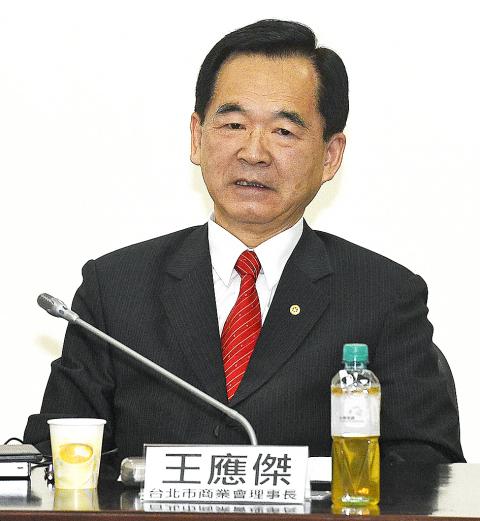Taipei Chamber of Commerce director-general Wang Ying-chieh (王應傑) yesterday apologized for calling Taiwanese who have never been to China jianmin (賤民, “uneducated masses”), saying that he bore no ill intent and was only concerned about deteriorating cross-strait ties.
Wang, who is also chairman of real-estate broker Eastern Realty (東森房屋) and vice chairman of Kuo Kuang Motor Transportion Co Ltd (國光客運), made the controversial remarks at a Taiwan Competitiveness Forum event on Thursday, sparking criticism from the public, with some threatening to boycott his businesses.
The Taiwan Competitiveness Forum is a think tank established in 2007 by a group of academics concerned about the cross-strait stalemate and Taiwan’s international predicament.

Photo: Chen Chih-chu, Taipei Times
“Why are Taiwanese gullible? Because only 7.5 million of them have been to China, while the remaining 15 million have not,” Wang reportedly said at the event.
Lamenting what he called the Taiwanese public’s ignorance of China’s remarkable progress over the past three decades, Wang said Taipei pales in comparison with many of China’s first-tier or even second-tier cities in terms of development.
“Many ignorant Taiwanese, or even those I call jianmin, do not even know which century they are living in,” Wang said, adding that the situation underscores the importance of engaging the younger generation when handling cross-strait ties.
He told reporters after the event that his use of the term jianmin was not directed at the general public, but rather at politicians who have demonized Beijing and fooled the electorate in a fashion similar to that of the Chinese Nationalist Party (KMT) regime’s irrational and undemocratic rule.
Democratic Progressive Party Legislator Lin Shu-feng (林淑芬) questioned whether Wang’s remarks were an attempt to expand his business in China, given that Eastern Realty opened its first directly owned branch in Jiangsu, China, in May.
Premier William Lai (賴清德) yesterday said in a legislative plenary session that such rhetoric, even revised, cannot be accepted by the public.
“After some soul-searching last night, I realized that my heartfelt remarks at the event, made due to my concerns about uncertainty in cross-strait exchanges, were too straightforward and a poor choice of words,” Wang said on Facebook yesterday.
Wang said that as an entrepreneur, he cares deeply about the nation and its democracy, adding that he hopes the government will prioritize the livelihood of 23 million Taiwanese and refrain from letting politics impede cross-strait economic exchanges.
“I bear no ill intent and hope the public can understand that the criticism came from a good place,” he said.

SECURITY: As China is ‘reshaping’ Hong Kong’s population, Taiwan must raise the eligibility threshold for applications from Hong Kongers, Chiu Chui-cheng said When Hong Kong and Macau citizens apply for residency in Taiwan, it would be under a new category that includes a “national security observation period,” Mainland Affairs Council (MAC) Minister Chiu Chui-cheng (邱垂正) said yesterday. President William Lai (賴清德) on March 13 announced 17 strategies to counter China’s aggression toward Taiwan, including incorporating national security considerations into the review process for residency applications from Hong Kong and Macau citizens. The situation in Hong Kong is constantly changing, Chiu said to media yesterday on the sidelines of the Taipei Technology Run hosted by the Taipei Neihu Technology Park Development Association. With

A US Marine Corps regiment equipped with Naval Strike Missiles (NSM) is set to participate in the upcoming Balikatan 25 exercise in the Luzon Strait, marking the system’s first-ever deployment in the Philippines. US and Philippine officials have separately confirmed that the Navy Marine Expeditionary Ship Interdiction System (NMESIS) — the mobile launch platform for the Naval Strike Missile — would take part in the joint exercise. The missiles are being deployed to “a strategic first island chain chokepoint” in the waters between Taiwan proper and the Philippines, US-based Naval News reported. “The Luzon Strait and Bashi Channel represent a critical access

‘FORM OF PROTEST’: The German Institute Taipei said it was ‘shocked’ to see Nazi symbolism used in connection with political aims as it condemned the incident Sung Chien-liang (宋建樑), who led efforts to recall Democratic Progressive Party (DPP) Legislator Lee Kun-cheng (李坤城), was released on bail of NT$80,000 yesterday amid an outcry over a Nazi armband he wore to questioning the night before. Sung arrived at the New Taipei City District Prosecutors’ Office for questioning in a recall petition forgery case on Tuesday night wearing a red armband bearing a swastika, carrying a copy of Adolf Hitler’s Mein Kampf and giving a Nazi salute. Sung left the building at 1:15am without the armband and apparently covering the book with a coat. This is a serious international scandal and Chinese

COUNTERINTELLIGENCE TRAINING: The ministry said 87.5 percent of the apprehended Chinese agents were reported by service members they tried to lure into becoming spies Taiwanese organized crime, illegal money lenders, temples and civic groups are complicit in Beijing’s infiltration of the armed forces, the Ministry of National Defense (MND) said in a report yesterday. Retired service members who had been turned to Beijing’s cause mainly relied on those channels to infiltrate the Taiwanese military, according to the report to be submitted to lawmakers ahead of tomorrow’s hearing on Chinese espionage in the military. Chinese intelligence typically used blackmail, Internet-based communications, bribery or debts to loan sharks to leverage active service personnel to do its bidding, it said. China’s main goals are to collect intelligence, and develop a